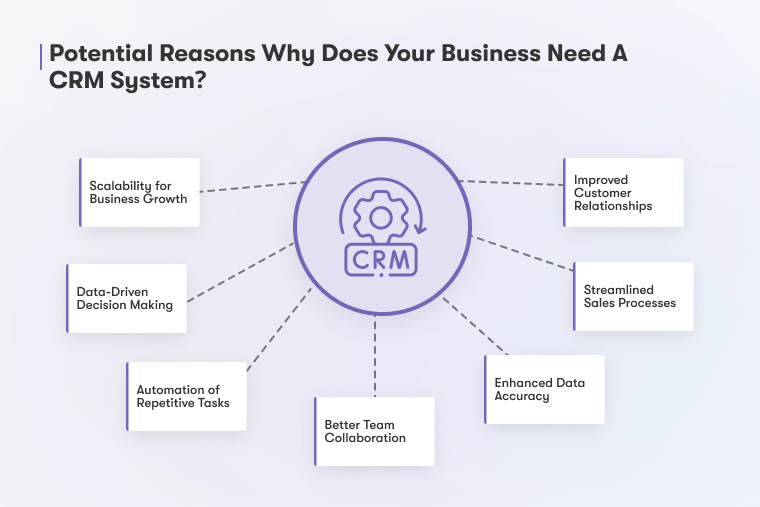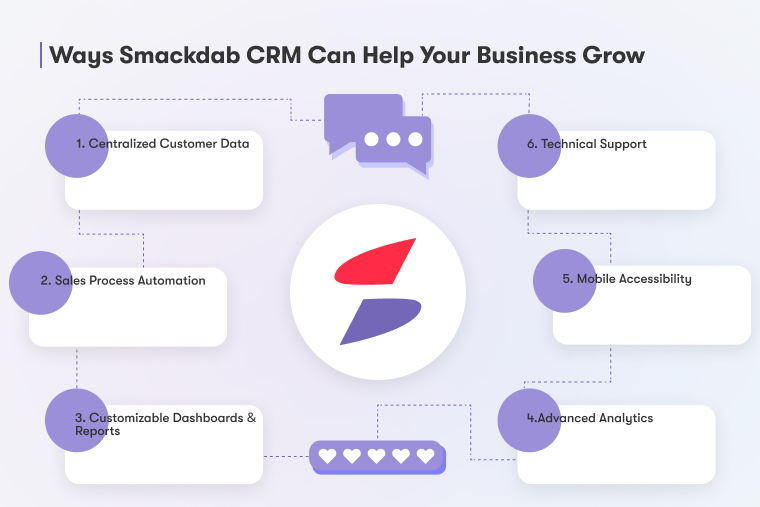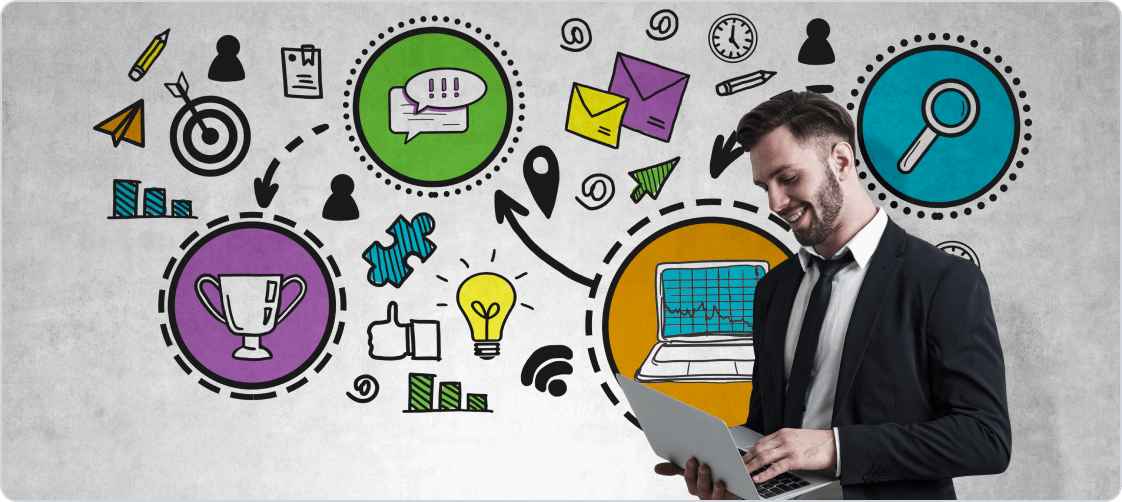Quick Summary
A CRM (Customer Relationship Management) system is no longer a luxury but a necessity in today’s business world. Whether you’re a small startup or an established enterprise, a CRM system helps streamline processes, build better customer relationships, and ultimately drive sales growth. In this blog, we’ll discuss the key reasons why your business needs a CRM system to stay competitive and efficient.
Introduction
Customer relationships are at the heart of any successful business. However, as your business grows, managing these relationships effectively can become challenging. This is why business needs CRM—to provide a centralized solution to help manage customer interactions, track data, and automate tasks—all while enhancing productivity. But, the question still arises, why do you need a CRM system?
Potential reasons Why Does Your Business Need a CRM System

Let’s explore the key reasons why a CRM is needed and how it can transform the way you work.
1. Improved Customer Relationships
You start juggling a lot with customer interactions at various touchpoints. To save you from getting confused, that is where the work of a CRM system comes in: it lets you track every conversation, every interaction, and every purchase history so that you never miss a beat.
Key Benefits:
- Centralized customer data for quick and easy access.
- Tailored communication and improved customer service.
- The capability to observe and respond to customer needs as they come up in real-time.
Insight:
79% of leads fail to convert into sales because of inadequate lead nurturing and follow-up.
Example:
Amazon hosts very good customer relationship management. They utilize CRM for tracking the customer’s preferences, history of purchases, and browsing habits. By doing so, they can provide the customer with personalized product recommendations and offers that will surely enhance the customer experience, all this while building loyalty much more effectively.
2. Streamlined Sales Processes
It automates repetitive tasks from leading to the close of deals and equips a sales team with everything it needs to thrive. Using CRM in businesses would appear utterly cogent when you think about how it takes rows upon rows of disorganized spreadsheets and manual tracking, and then replaces those with an end-to-end system.
Key Benefits:
- Automates lead management and follow-ups.
- Provides clear visibility into the sales pipeline.
- Increases conversion rates by helping your sales team stay organized and focused.
Insight:
CRM systems can increase sales by up to 29%, sales productivity by 34%, and forecast accuracy by 42%.
Example:
Coca-Cola implemented a CRM system to streamline its sales processes. By automating repetitive tasks and using data insights, the company improved the efficiency of its sales teams and better targeted its marketing efforts, leading to an increase in overall sales.
3. Enhanced Data Accuracy
Accurate data is crucial for making informed business decisions. CRM system keeps all your customer data current and at your fingertips, eliminating the possibility of human error, and inconsistent data. That’s another reason why CRM should be in every business.
Key Benefits:
- Eliminates manual data entry errors.
- Real-time data updates across all departments.
- Consolidated view of customer information for better decision-making.
Insight:
Data inaccuracies cost businesses an average of 15% to 20% of their annual revenue.
Example:
Apple relies on CRM systems to ensure all customer data is up-to-date and accurate across all departments. This exact data is key to maintaining their high level of customer service, helping them tailor support and product offerings to each customer’s needs.
4. Better Team Collaboration
A CRM system allows all departments—sales, marketing, customer support, and operations—to work from the same data. This encourages better collaboration across teams and ensures everyone is aligned when serving customers.
Key Benefits:
- Improves communication between departments.
- Centralized information for better cross-team collaboration.
- Increases overall productivity with a unified view of customer interactions.
Insight:
91% of businesses with more than 11 employees use a CRM to enhance collaboration across teams.
Example:
Tesla uses CRM tools to centralize customer data and ensure that all departments—sales, marketing, and service—are aligned. This collaboration helps provide a consistent experience for customers, whether they are buying a car, receiving maintenance, or engaging with the brand online.
5. Automation of Repetitive Tasks
Tasks like data entry, follow-up reminders, and reporting can take up valuable time. A CRM automates these tasks, freeing up your team to focus on more strategic activities that drive growth. This is why you need a CRM system to help you automate tedious tasks and increase efficiency.
Key Benefits:
- Automates routine tasks like email campaigns and follow-ups.
- Reduces manual work, allowing teams to focus on high-priority tasks.
- Boosts productivity while minimizing errors.
Insight:
CRM systems can reduce 23% of the overall costs by automating repetitive sales and service tasks.
Example:
HubSpot automated many of its repetitive marketing and sales tasks using its own CRM platform. By automating email marketing campaigns, follow-up reminders, and lead scoring, HubSpot was able to scale its operations efficiently and focus on higher-priority tasks.
6. Data-Driven Decision Making
A CRM system gives you access to powerful analytics and reporting tools, allowing you to track performance metrics, customer behaviors, and sales trends. This is why CRM is needed—it helps businesses make data-driven decisions to improve their strategies.
Key Benefits:
- Access to real-time performance insights and reports.
- Ability to track KPIs and optimize strategies based on data.
- Improves forecasting accuracy and planning.
Insight:
Companies that use analytics are 300% more likely to make faster decisions.
Example:
Through the advanced capability of their CRM, Nike has insight into customers’ preferences, sales patterns, and identifying trends. Such marketing intelligence helps Nike to prepare in advance for its marketing campaigns, selling of products, and interacting with its customers.
7. Scalability for Business Growth
As your business grows, so do your customer management needs. A CRM system scales with you, providing the tools and support needed to handle increased customer interactions and a growing sales pipeline.
Key Benefits:
- Scales with your business needs without losing effectiveness.
- Supports growing sales pipelines and larger customer bases.
- Future-proof your business by offering flexibility and adaptability.
Insight:
72% of businesses with more than 11 employees use CRM systems to manage customer relationships and scale operations (Capterra).
Example:
Microsoft scaled its operations with the help of CRM systems. The company could trace its customer interactions with much ease across its huge and global network of customers. As it grew further and the number of products it dealt with also expanded, the CRM helped in providing high-quality service to its customers.
Conclusion
Having a centralized CRM is a highly profitable business plan owning to its perk of being able to assist your company in handling customer relationships significantly better, as well as operations flow more smoothly, and make well-informed decisions. If you are planning to provide better customer service, increase your sales, or even just simply get your business up and running in an efficient manner, you have all the reasons to inculcate a CRM in your organization. Ready to take your business to the next level? Invest in a CRM system now.
Ways Smackdab CRM Can Help Your Business Grow

Smackdab CRM is here for all of your needs, regardless of size or industry domain. It is a CRM system that offers varied advantages, among many others. Let me show you how Smackdab can streamline your processes to better your customer relationships for more growth:
Centralized Customer Data: Smackdab keeps all your customer information in one place, ensuring your team has easy access to up-to-date customers’ data, and allowing for personalized customer interactions.
Sales Process Automation: With Smackdab’s automation features, you can automate lead nurturing, follow-ups, and sales tasks, enabling your sales team to focus on closing deals and building relationships.
Customizable Dashboards and Reports: Smackdab provides flexibility with customizable workflows, reports, and dashboards that align with your specific business needs, allowing you to track performance and make data-driven decisions.
Advanced Analytics: Smackdab gives you access to real-time analytics, helping you monitor KPIs, forecast sales, and optimize your business strategy based on actionable insights.
Mobile Accessibility: Smackdab’s mobile-friendly design ensures your team can access the CRM from anywhere, making it perfect for businesses with on-the-go sales teams or remote workers.
Technical Support: Smackdab offers reliable technical support around the clock, ensuring that any issues that arise are resolved quickly, thus the business keeps running smoothly, interruption-free.
With Smackdab CRM, you get a comprehensive solution that’s built to grow with your business, helping you manage customer relationships, improve productivity, and drive long-term success.









